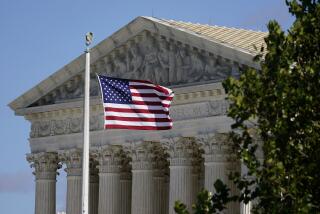High Court to Review Corporate Gift Case
- Share via
WASHINGTON — The District of Columbia is the center of the nation’s lobbying and influence-peddling industry.
It is also the one place in America where it is legal for lobbyists and corporate officials to give large and expensive gifts to high-government officials.
But this immunity for gift-bearing lobbyists may be about to end.
On Monday, the Supreme Court said that it would review a ruling from the U.S. Court of Appeals here that said corporations that bestow favors on powerful officials cannot be prosecuted without evidence that they sought a specific favor in return.
That 2-1 ruling in March overturned the criminal conviction of Sun-Diamond Growers, a California farm cooperative. Its officials had given then-Agriculture Secretary Mike Espy gifts worth more than $9,000.
Until March, the Justice Department had maintained that it was illegal for corporations and their lobbyists who had business before an agency to give “anything of value” to a powerful official.
Lawyers for the advocacy group Public Citizen welcomed the court’s move. “As it stands, the nation’s capital is the one city where lobbyists can give large gifts to officials, which is somewhat perverse,” said Cornish Hitchcock, a lawyer for Public Citizen.
The Supreme Court will hear arguments on the scope of the anti-corruption law in February and issue a ruling later.
Meanwhile, the court announced no actions on two closely watched cases: one involving the president’s claim of an attorney-client privilege for White House lawyers and the other testing the constitutionality of school vouchers. Both appeals came before the court in last Friday’s closed conference.
The justices may be closely split on the issues. It takes a vote from at least four of the nine justices to grant a hearing on an appeal. Sometimes, when two or three members--but not four--wish to grant a hearing, the case is carried over to the next week for another vote.
Or, the court may have wanted to delay an announcement on these cases until after today’s balloting. The impeachment question is a key underlying issue in congressional elections, and voters in Colorado will cast ballots on a measure that would give tax credits to parents who send their children to parochial schools.
The high court will meet again Friday and the justices likely will take up the two pending appeals for a second time. If so, they probably will announce Monday whether they will hear the cases.
The lobbying case (United States vs. Sun-Diamond Growers, 98-131) tests the reach of the Unlawful Gratuity Act, a long-standing weapon for prosecutors in government corruption cases. The law makes it a federal crime for anyone to give or promise “anything of value” to a public official in exchange for “any official act performed or to be performed.”
Justice Department prosecutors had maintained that this made it illegal for corporations and their lobbyists to give any substantial gifts or money to an official who had power over their industry. It would create at least an appearance of corruption, they said, if lobbyists could curry favor by bestowing lavish gifts on government regulators.
Most federal judges have adopted that view and said that lobbyists who give gifts to officials because of their powerful positions violate the law, even when there is no clear link between the gift and a specific act performed.
The U.S. Court of Appeals here disagreed, however. Interpreting the statute literally, the appellate judges said that the questionable gifts must be linked to an “official act performed” by the recipient.
In 1993, Richard Douglas, a college friend of Espy’s and an official of Sun-Diamond, gave the new agriculture secretary tickets to the U.S. Open Tennis Tournament worth $2,295, luggage worth $2,427, meals worth $665 and a crystal bowl worth $524. The company also paid the $3,100 cost for Espy’s girlfriend to accompany him to the International Nut Conference in Athens.
Independent counsel Donald C. Smaltz, who was appointed to investigate Espy’s dealings, charged Sun-Diamond with giving the agriculture secretary unlawful gratuities. He noted that farmers were concerned about a pending environmental regulation that could have halted the use of methyl bromide, a pesticide, and the cooperative members may have hoped that Espy would intervene on their behalf.
The jury was told that it should convict Sun-Diamond if the gifts were bestowed “because of the secretary’s position.”
Based on that guidance, the jury convicted the corporation and it was fined $1.5 million.
However, the appeals court reversed the conviction and said it is not illegal to give gifts to a Cabinet secretary “merely to win his general sympathy” for the corporation.
Appealing to the high court, Smaltz said that this ruling, unless reversed, “seriously undermines the enforcement” of federal anti-corruption laws.
More to Read
Sign up for Essential California
The most important California stories and recommendations in your inbox every morning.
You may occasionally receive promotional content from the Los Angeles Times.














